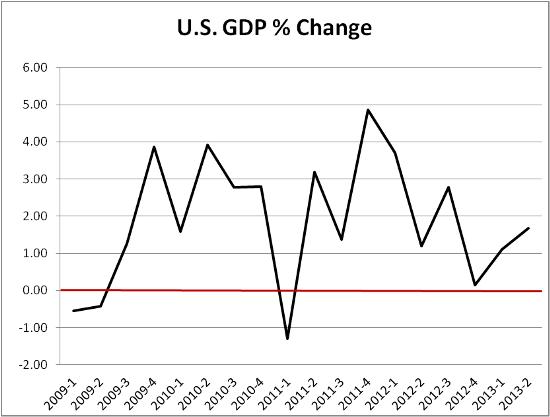Currency
Applications for unemployment insurance payments declined by 19,000 to 326,000 in the week ended July 27, the fewest since January 2008, from a revised 345,000 the prior week, the Labor Department reported today in Washington

Manufacturing in the U.S. expanded at the fastest pace in more than two years as orders and production jumped, indicating more factories were growing optimistic about the second half of the year.
The Institute for Supply Management’s factory index increased to 55.4, the strongest since June 2011 and exceeding the highest projection in a Bloomberg survey of economists, after 50.9 in the prior month, the Tempe, Arizona-based group’s report showed today. Readings above 50 indicate expansion, and the median forecast of 84 economists surveyed by Bloomberg called for an advance to 52.
….read more HERE


The Fed just made an announcement that the markets liked:
Fed stays on track with bond buying, for now
WASHINGTON (Reuters) – The Federal Reserve said on Wednesday the economy continues to recover but is still in need of support, offering no indication that it is planning to reduce its bond-buying stimulus at its next meeting in September.The central bank said after a two-day meeting that it would keep buying $85 billion in mortgage and Treasury securities per month in its effort to strengthen an economy that it said was still challenged by federal budget-tightening. It also pointed to a recent run up in mortgage rates.
In a post-meeting statement, policymakers described economic activity as having expanded at a “modest” pace in the first half of the year. They had called the recovery “moderate” after their last meeting in June.
In another departure, the Fed’s policy-setting committee signaled some concern about the low level of inflation.
“The committee recognizes that inflation persistently below its 2 percent objective could pose risks to economic performance, but it anticipates that inflation will move back toward its objective over the medium term,” the Fed said.
Why the cautious tone when just a few months ago “tapering” was a sure thing by yearend? Because this morning’s GDP report was, as usual, much weaker than it looked. Here’s a quick summary from Consumer Metrics Institute:
The new set of numbers for the 2nd quarter of 2013 in fact show weaker growth than previously reported numbers for the 1st quarter, but through the magic of historic revisions the headline (and the press release) can now tout quarter-to-quarter economic improvement — which should excite any markets that are blindly eager for good news, even if that good news is constructed from a revisionist history.
Unfortunately, we can’t ignore a pattern of significant downward revisions to recent past data — suggesting a deeply rooted positive bias in the BEA’s “real time” reporting, including each of the prior four quarters. Even the number published just last month was revised materially downward by -0.64% (i.e., over a third of the previously reported growth has vanished).
Among CMI’s other points:
- The inflation number used to arrive at 2Q GDP is biased, and using a realistic deflator would yield a much lower growth number.
- A big part of 2Q growth came from rising government spending, which, in light of the debt ceiling debate, Detroit’s bankruptcy and Chicago’s recent downgrade probably isn’t a good bet going forward.
- Rising inventories, which move growth from the future into the present. Higher inventories today mean less production tomorrow. See American automobile glut: cars are piling up.
Even if we accept all the fluff in today’s numbers, a chart of recent GDP growth shows a hard stall, not a take-off. The Fed knows all this and has now completely walked back its talk of lowering its asset purchases. QE will go on until the market, not government, puts a stop to it.

Did Wall Street Miss A Bribe Payment?
It’s hard to know which aspect of today’s world future historians will find most appalling. But the fact that during the greatest financial crime spree ever, not a single major Wall Street executive has gone to jail has to rank right up there.
…..read more HERE

Over the last couple of days, we have seen news coverage of McDonald’s employees in the U.S. protesting their level of pay. The basic message they are trying to convey is that they are not able to keep up with the cost of living at their current wage.
That runs counter to the rhetoric communicated by the U.S. Federal Reserve. Inflation is under control, so why are people starting to complain about the cost of living?
William Dudley, the President of the Federal Reserve Bank of New York, famously addressed a group of cost-of-living protestors in New York last year and stated that they shouldn’t be complaining because advances in technology (and, thus, the quality of life) had been greater than general price increases for goods. He got specific when he referenced how iPads have become more powerful but that the price rise for an iPad had not been commensurate with that increase in power.
Protesters replied that there were “not able to eat iPads.” Normally economic protestors have it wrong, but in this case they were right. The issue is about inflation in the price of basic necessities, not about technological advances offsetting costs (which, incidentally, has been somewhat of a religion at the Federal Reserve since Alan Greenspan’s term).
With respect to the McDonald’s employees, the demands for a higher minimum wage is certainly not good economics. However, their inadvertent insights into the fact that inflation is lurking in the area of basic necessities, which being officially ignored by politicians and policymakers alike, is a valuable lesson.











